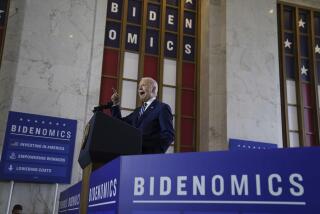Bush Backs Gorbachev on Economic Reforms : President Distances Himself From Cheney’s View That Hard-Liners Will Scuttle Program
- Share via
WASHINGTON — President Bush, leading his Administration’s retreat from Defense Secretary Dick Cheney’s prediction that economic reforms in the Soviet Union will fail, offered strong support Monday for President Mikhail S. Gorbachev’s program.
“Whenever in the world there is economic reform,” Bush declared in a speech to the U.S. Chamber of Commerce, “the United States should be hoping that reform succeeds.”
But others in the Administration were less ready to endorse Bush’s view. One Administration official insisted that Cheney, in predicting the failure of Gorbachev’s economic policies and his consequent replacement with a hard-liner, was giving voice to “a body of opinion” that is supported by some other senior officials.
Bush’s remark, his first that went to the heart of the comments that Cheney made in an interview Friday, represented a further step by the government in support of Gorbachev’s policy of perestroika-- his campaign to implant a measure of free enterprise in the Soviet economy and to free it from bureaucratic inertia.
“Even the socialist world is beginning to see that socialism isn’t just another economic system--it’s the death of economics,” Bush said. “There is a new breeze blowing. Nations the world over are coming to realize and recognize that free enterprise is the wave of the future and that’s a promising forecast for prosperity and for world peace.”
The Administration’s sensitivity to Cheney’s comments could be seen throughout the government. Publicly, White House and State Department spokesmen stressedthat Cheney’s view is not support ed by other senior officials.
At the State Department, spokeswoman Margaret Tutwiler was ready for reporters’ questions with a statement that Secretary of State James A. Baker III “sees the issue exactly as the President and expects to represent that view in Moscow next week” when he meets with Gorbachev and Soviet Foreign Minister Eduard A. Shevardnadze.
Indeed, she pointed out that Baker had expressed such a view on April 14, when he said in a speech: “We very much want perestroika to succeed and we very much want the general secretary (Gorbachev) to succeed. We think that’s in the best interest of the United States and the best interest of the world because it will result in a more open, stable and secure Soviet Union.”
White House Press Secretary Marlin Fitzwater said that Bush had not spoken with Cheney about the defense secretary’s remarks. He emphasized that the Administration had one policy regarding Gorbachev’s economic experiment, although he refused to say whether the government expects Gorbachev to succeed.
Reading from prepared notes, he told reporters that “the Administration’s position on the Soviet Union, whether expressed by President Bush, Secretary Baker or Secretary Cheney, reflects the view that we want reform to succeed.”
At the same time, an undercurrent of concern about the future of economic reform in the Soviet Union continued to seep through the Administration. At a meeting of the White House senior staff, officials argued that the points raised by Cheney are not necessarily inconsistent with Administration policy. Cheney expressed a personal opinion about what he thought would happen, they said, while Bush and others have limited themselves to discussing what they hope will happen.
In his remarks, taped Friday and aired a day later on CNN’s “Evans & Novak” program, Cheney said Gorbachev faces an entrenched conservative Soviet bureaucracy that has a vested interest in maintaining central economic control.
“My personal view is that the task that he set for himself of trying to fundamentally reform the Soviet system is incapable of occurring,” he said. “If I had to guess today, I would guess that he would ultimately fail.
“That is to say that he will not be able to reform the Soviet economy to turn it into an efficient, modern society. And that when that happens, he’s likely to be replaced by somebody who will be far more hostile than he’s been in terms of his attitude toward the West.”
In his speech, the President said that the United States favors Gorbachev-style economic reforms wherever they are tried.
“Economic reform, with its emphasis on incentive and market economics, leads to more freedom,” he said.
He said that he expressed his support for perestroika when he met with Gorbachev on Dec. 7 in New York. Similarly, he said, “we want to see success for the economic reforms in China.”
“Incentive, economic reforms, market economies, private ownership are indeed replacing socialist dogma in many countries, large and small,” he said. “And that is an exciting trend, and in my view, it will continue.”
The date--May 1 or May Day, the equivalent of Labor Day in the many nations around the world--set the stage for a Bush joke about perestroika. The Soviet economy is in such need of overhaul, he said, that “even the Economic Planning Ministry had a unit” in the annual May Day parade. It consisted, he said, of “200 economists marching along yelling: ‘Mayday, mayday!’ ”
More to Read
Get the L.A. Times Politics newsletter
Deeply reported insights into legislation, politics and policy from Sacramento, Washington and beyond. In your inbox twice per week.
You may occasionally receive promotional content from the Los Angeles Times.










